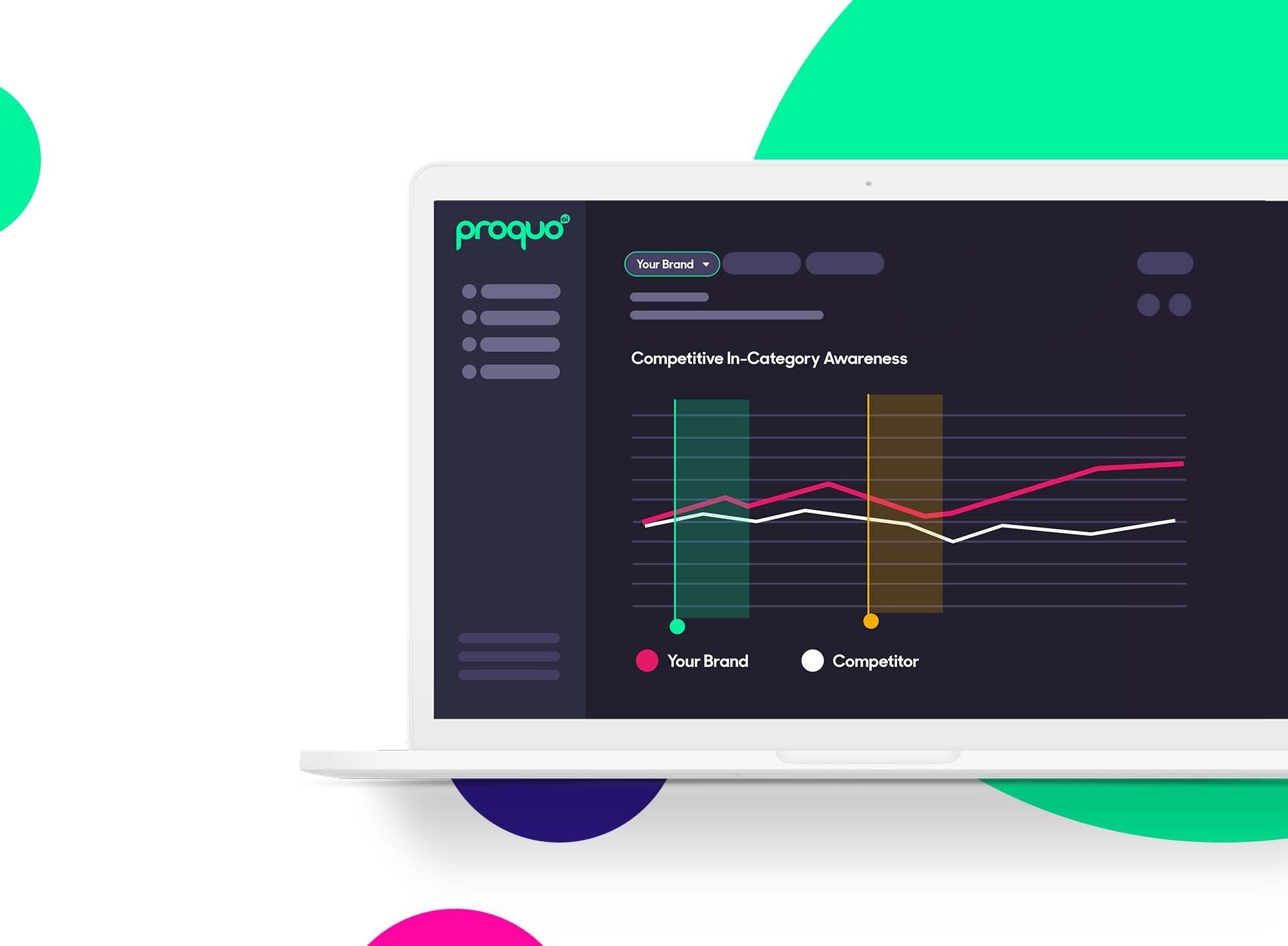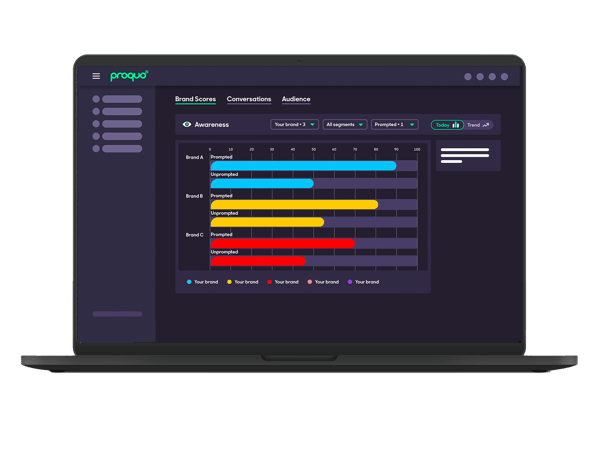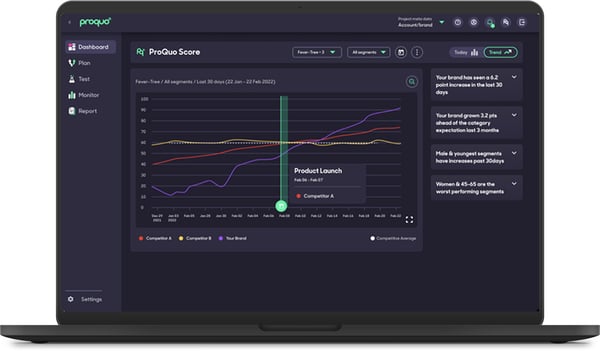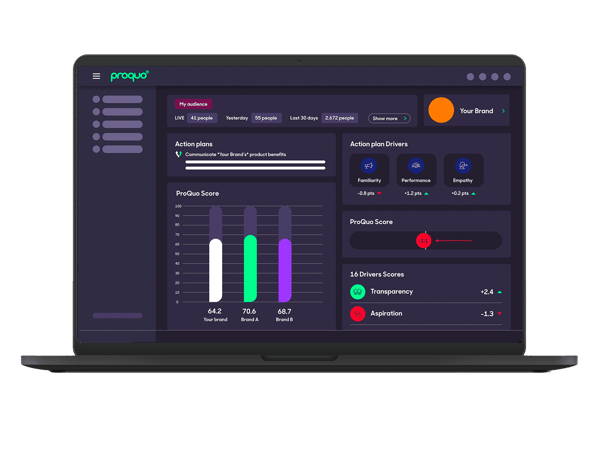Brand Measurement: Frameworks, tools and best practices

In marketing, practically everything we do is measurable.
Social. eCommerce. Email. The list goes on and on.
With so many different assets to measure and countless ways to measure these, of course this comes with some challenges.
In this guide, we’ll be exploring:
Awareness tracking will give you a quick read on the reach of your brand and its marketing activities.
By measuring unprompted awareness - the percentage of people that think of your brand when asked to name as many brands they can within a category - you can discover how top of mind you are. Monitoring prompted awareness, in addition to this, will give you an idea of how recognized you are versus your key competitors.
However, an important thing to remember is that awareness doesn't always correlate directly with sales.
If your brand was affected by a negative PR scandal, for example, more people would know about you. But it's unlikely this increased exposure would lead to additional revenue.
The sales journey is also much more complex than awareness=sales. It encompasses a variety of different experiences, which occur across multiple channels and over different time periods.
And even when you win the customer, value must be redefined over time to retain loyalty.
Modern measurement methods take this into account, tracking brand performance, awareness and sales growth, in real-time. This means you always know how many people are aware of your brand and your competitors' brands - and you can see how this score grows in context alongside other key performance indicators.

Currently, brand equity is viewed as a measure of value.
It's depicted by a simple equity score, with a higher score indicating that your consumers are more likely to consider your product.
But value is an intangible concept and can be complex to define, and complex to measure.
We live in a world where there are countless brands offering similar products for similar prices. How then can you determine what is of higher value?
Neuroscience has proven that 95% of buying decisions are made via our System 1 - the subconscious part of our brain where feelings reside.
If that's the case then value should defined by the relationships consumers hold with a brand.
Think about toothpaste. We all buy it. Each product is largely the same. So why are we loyal to a specific brand every time?
This comes back to the relationship we hold with that brand.
It's about how they make us feel. If we have more positive feelings towards one brand, we'll be more likely to purchase them over a competitor.

Brands are now going beneath the surface of equity, digging into the strength of their relationships with consumers to better understand how they can build value.
Live Brand Equity trackers allow you to see how your relationships - and those of your competitors - are developing in real-time - as times change, as consumers' needs evolve, and as marketers make decisions on new products, campaigns and in-store activities.
They show you where your consumers feel you are delivering best - be it the emotional benefits of your product or the rational - and they uncover opportunity spaces for you to move into to deepen these relationships.
To understand how many people know about your brand and where these sources of traffic originate from, you can track the individual impact of your marketing activities.
You could also consult your CRM, analyze your social metrics or look at ROI figures.
However, to really know how your brand is performing on a holistic level, so you can prove that what you're doing is working, you'll need an integrated Brand Measurement platform.
To avoid wasted marketing spend, you need to be able to understand how every activity you do is impacting your brand and your business.
These platforms give you insight into your performance by measuring every aspect of your brand - from your relationships with consumers to the impact of your campaigns and the success of your competitors.
And because these platforms work in real-time, you can isolate which activities are working the hardest for you so your brand is only focusing on the most profitable ventures.

To understand 5 use cases of these platforms, click here.
An integrated Brand Measurement platform - like ProQuo AI - allows you to measure virtually anything.
The platform's easily accessible virtual dashboard shows you your shows you your brand equity score changes, provides live feedback from your consumers, and gives you an understanding of which marketing activities are working the hardest for your brand.

Here is a selection of the types of things you can measure on the platform for your brand and competitors:
To ensure you're getting the most value of your brand measurements, you can ask yourself the following questions:
1. What is it that you hope to see on the platform?
Are you looking to discover how people feel about your brand versus the competition? Are you wanting to see how your consumers react to a new launch or are you after more clarity on the impact of one of your marketing activations?
2. How will you establish benchmarks and set your team up for success?
This can be done by exploring your category and competition on the platform to understand the scope of the opportunity within your space.
To set your team up for success, you can also set clear KPIs against the key parts of your brand that you're wanting to grow (indicated by score increases) or maintain (indicated by a lack of score decreases). Reviewing your progress against these KPIs over time will help to inform your ongoing brand strategy.
3. Which teams will you include on the platform?
The beauty of a platform like ProQuo AI is that any team with access has full visibility over your brand and commercial scores. This means Product, Insights, Marketing and the C-suite can collaborate effectively together in one central location.
4. How will you present your data to stakeholders?
The ProQuo platform creates reports for you to help you understand your performance at a glance. These reports can be run over specific time periods, events, and more.

5. How will you action your data?
On ProQuo, marketing teams receive accessible insights that are quick to understand and easy to action. To transform your data points into actions, you can use any number of ProQuo's charts to analyze your performance in a clear and visual way to help your brand determine the best course of action.
Marketing today is much faster and more creative than the research that serves it.
There are new solutions and changes that have been made, which you can embrace today to supercharge your growth.
If you want to see how ProQuo AI's brand measurement can help your brand, chat to us here.
Our platform will take your brand further, faster.
© 2020-2023 ProQuo AI International
All rights reservedWebsite by Blend